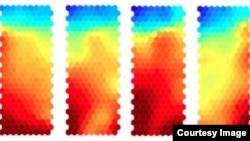Using allergy treatment as a model, researchers have figured out a way to switch off autoimmune diseases in which the body attacks its own tissues, and making the immune system protective against disease. The therapy could represent a revolution in the treatment of autoimmune ailments such as multiple sclerosis and lupus.
The immune system protects against illness by recognizing and attacking harmful microbial invaders, including bacteria, viruses and parasites. But in people with an autoimmune disease, such as multiple sclerosis, Type 1 diabetes, lupus or Grave’s disease, those protective immune system cells mistakenly attack the body’s own tissues.
Now, researchers at the University of Bristol in Britain have figured out a way to switch off that attack in a mouse model of multiple sclerosis. They exposed the animals to the antigens, or the proteins that are attacked in MS. That not only quieted the immune system, but turned it into a protective mechanism against disease.
The therapy is similar to the treatment for environmental allergies. Patients are injected with small amounts of the harmless pollen or dust antigens that make the body overreact, causing sneezing, rashes and itchy, watery eyes.
Eventually the immune system becomes desensitized to the irritant, and retrained not to produce an allergic reaction.
“We restore sort of a state of immune normality in these people," said researcher Bronwyn Burton, who works with the MS study. "So, hopefully they will still be able to respond to infections, they are able to fight off infections very readily, but they will not be able to mount these devastating autoimmune responses anymore."
Multiple sclerosis causes paralysis when the body attacks the protective outer coating of nerve cells, called myelin, thwarting motor impulses from the brain that control movement.
Researchers gave a gradually escalating dose of myelin antigens to the mice with MS-like disease, gradually switching off the misdirected immune attack. The work is described in the journal Nature Communications.
A biotech company is conducting clinical trials of the therapy in MS patients. There are an estimated 2.5 million people around the world with multiple sclerosis.
Burton agrees the immunotherapy could represent a sea-change in the way people with MS and other autoimmune diseases are treated.
“So, it is a really promising treatment approach for the future, although at the moment for the treatment of autoimmune disease still in fairly early phases of development," said Burton.
University of Bristol researchers believe they could use the same approach to treat other autoimmune diseases, including juvenile diabetes, and are now trying to identify harmless proteins that come under attack in those diseases, so they can develop therapies.




